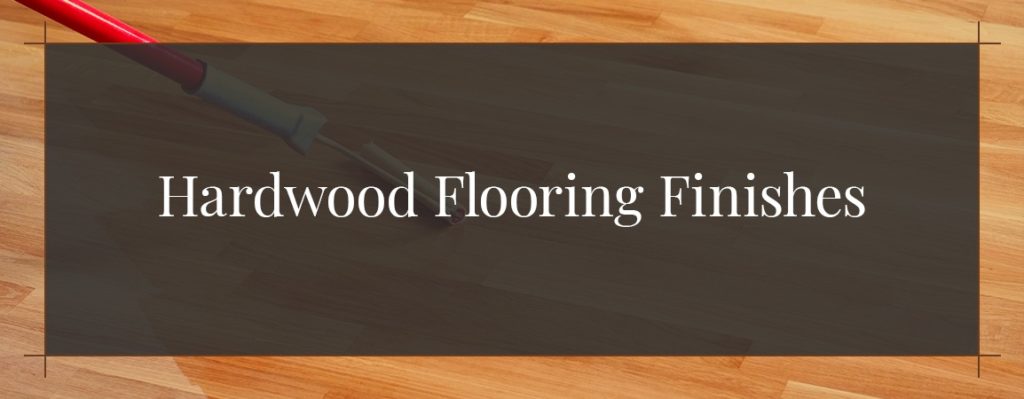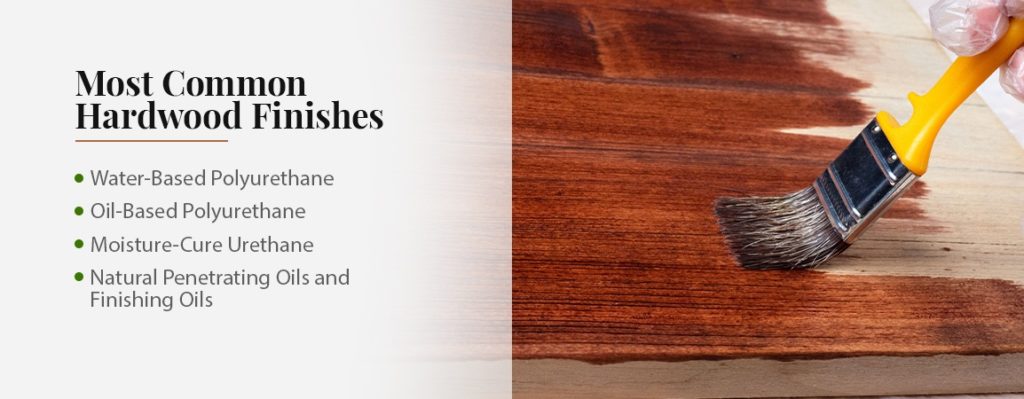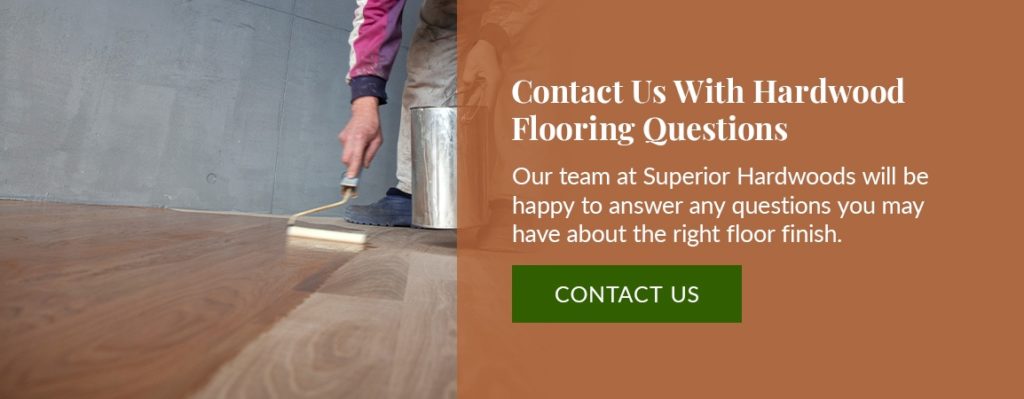
After you’ve installed your luxurious hardwood flooring, you will want to apply a sealer and floor finish to enhance its durability and maintain its appearance over time. Since there are so many finish types for real hardwood, it’s helpful to know each of the pros and cons to make the right decision. Explore the most common hardwood finishes find the best one for your property.
Important Things to Know About Different Hardwood Floor Finishes
Before you choose a finish for your hardwood flooring, you’ll need to understand the following terms.
- VOCs: Many hardwood floor finishes contain volatile organic compounds that release vapors as they cure. These gases can affect your indoor air space’s indoor air quality and harm your health. Consider no-VOC, zero-VOC and low-VOC options to create a safe environment for you and your loved ones.
- Drying time: After applying the finish, you’ll need to wait until you can step on the floor safely without imprinting the surface. Check the manufacturer’s instructions for the dry time for your specific product. You’ll need to stay out of the room during this period to prevent dents, dirt and debris from settling into your floors. The manufacturer may also recommend when you can return furniture and carpeting to the room.
- Durability level: You usually apply a hardwood flooring finish to make floors hold up better against wear and tear. The product should keep your flooring in excellent condition to protect your investment. Consider which product will withstand the traffic in the room with hardwood floors.

Most Common Hardwood Finishes
With the factors above in mind, you can decide on the best type of hardwood flooring for your home. Discover the pros and cons of the following finish types for natural hardwood.
Water-Based Polyurethane
Water-based polyurethane is best for floors that need a quick-drying, clear finish. Flooring professionals prefer water-based polyurethane because of the following qualities.
- Ease of installation: Due to its quick drying time, water-based polyurethane is convenient for homeowners to apply themselves.
- Low odor and VOC: Water-based polyurethane is a low-VOC flooring finish, which is better for the environment and your home’s indoor air quality. It also doesn’t produce that many odors during application. Bona floor finish, a reputable water-based polyurethane product, boasts a low VOC count.
- Short dry time: You only have to wait a few hours between coats for this flooring finish. After application, you can walk on your floors after giving it adequate time to dry, but you should still hold off on moving the furniture back into place for several days.
- Resists yellowing: This type of flooring finish dries clear and maintains your floor’s natural color instead of causing it to turn yellow over time.
- Multiple options for sheen of the finish: Most homeowners use high a satin water-based polyurethane, but you can also get a matte, semi-gloss or high gloss finish. There is also a commercial version available with a hardener ideal for commercial applications.
It’s also helpful to know some of the drawbacks of this flooring finish.
- More susceptible to scratch: The newer generation of water-based polyurethane is remarkable hard, which can scratch from fine debris.
- Cost: Water-based polyurethane can cost two to three times the oil based products.
Oil-Based Polyurethane
As a durable, wear-resistant floor finish, oil-based polyurethane is ideal for hardwood flooring in high-traffic areas. Some of the advantages of this finish include the following.
- Strong and long-lasting: Since oil-based polyurethane has plasticizers, linseed oil and synthetic resins, it’s more durable than other flooring finishes. You can go a long time without needing to refinish your floors.
- Easy to maintain: After applying oil-based polyurethane, you can conveniently clean your floors with a vacuum or broom.
With these benefits in mind, you may also want to consider the following drawbacks of oil-based polyurethane.
- Slow drying: Even though oil-based polyurethane requires fewer coats than water-based polyurethane, you’ll need to allow more drying time between coats. After you’ve finished applying the last coat, you should wait at least two days to walk on the floors and four days to put furniture back in the room.
- Releases many VOCs: This finish produces a pungent odor and releases a high level of VOCs. Since you need a respirator to protect your lungs, you should have a professional apply this finish to your floors.
- Yellows over time: Unlike clear water-based polyurethane, oil-based polyurethane has a slightly yellowish, amber tint. Over time, it turns your hardwood flooring more yellow.
Moisture-Cure Urethane
As the most durable finish, moisture-cure urethane is most suitable for commercial applications such as bowling alleys, restaurants and dance halls. Even though it resists moisture, stains and scratches, you may want to avoid using it in your home for the following reasons.
- Very high VOCs: The odors from the VOCs in this type of flooring finish can linger in the air for several weeks, reducing the quality of your indoor air. You’d have to make accommodations for you and your family while the floor finish dries.
- Difficult to apply: You have to install moisture-cure urethane in the right humidity conditions for maximum effectiveness because it draws moisture from the air. It’s best to leave it up to a professional.
Natural Penetrating Oils and Finishing Oils
Natural oil finish emphasizes the wood’s natural graining. Homeowners prefer this product for their hardwood flooring for the following reasons.
- Natural product: Since this flooring finish is free of VOCs and odors, it’s better for your health.
- Brings out wood’s beauty: You may want to use natural penetrating oils such as tung oil or linseed oil to bring out your hardwood flooring’s natural colors and graining without adding a high shine or gloss.
On the other hand, there are some things you should know about applying natural penetrating and finishing oils.
- Not very durable: Even though penetrating oils can help prevent general wear and scratches, they won’t protect your flooring as well as other flooring finishes. You may have to apply a new coat of penetrating oils every few years to withstand the traffic in your area.
- Slow drying time: You might have to wait an entire day between coats for penetrating oils to dry.

Contact Us With Hardwood Flooring Questions
As professionals in the hardwood flooring industry, our team at Superior Hardwoods will be happy to answer any questions you may have about the right floor finish for your natural hardwood floors. Reach out to us online or call 406-235-7452 for more information about caring for the hardwood floors in your Montana home.